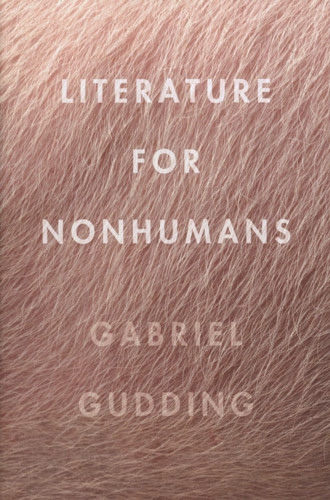Literature for Nonhumans
In hybrid poem essays, Literature for Nonhumans, Gabriel Gudding has taken on the system in which we live at the level of mind and body, beliefs, laws, and values by way of our effects on the nonhumans sharing this planet with us. In “the nonhumans,” besides animals, he includes rivers, mountains, wetlands, trees, landscapes, bio niches. The nonhumans are looking back at us in their own right, subjectivity given to animals and landscapes, both seen as a “who.” By the end of the book we have a coherent viewpoint of the effect of humans on life for the reader’s consideration. The book is a disorienting set of ideas that produces a cry of the heart as we look through the lens of human ensconcement blithely operating the socio-economic system with its steamroller collateral damage.
In hybrid poem essays, Literature for Nonhumans, Gabriel Gudding has taken on the system in which we live at the level of mind and body, beliefs, laws, and values by way of our effects on the nonhumans sharing this planet with us. In “the nonhumans,” besides animals, he includes rivers, mountains, wetlands, trees, landscapes, bio niches. The nonhumans are looking back at us in their own right, subjectivity given to animals and landscapes, both seen as a “who.” By the end of the book we have a coherent viewpoint of the effect of humans on life for the reader’s consideration. The book is a disorienting set of ideas that produces a cry of the heart as we look through the lens of human ensconcement blithely operating the socio-economic system with its steamroller collateral damage.
Human control is wielded by dominance and insertion of our wants and needs into the fabric of life that surrounds us. Essentially all the rivers and oceans have become the “toilet bowl” of human activity, not only of sewage of seven billion humans, but run-off of toxic waste from mining and industrial processes. He uses science, history, and government data to construct a moral critique of what our actions do to the nonhuman. Social Darwinists and entrepreneurial capitalists most likely will dismiss this critique as utopian. But Gudding goes past this limited categorization to question fully how humans live on this planet in balance with other nonhuman forms so that we ourselves will survive. This is the question of our time.
Teaching creative writing at the University of Illinois, he uses the state of Illinois as a microcosm of how Western civilization affected the land and original natives of the North American continent. Three-fourths of Illinois prior to European settlements was wetlands, and now they are three percent. Out of Illinois originated much land use technology:
the steel plow 1837 John Deere, [ . . . ] barbed wire 1874 Joseph Farwell Glidden, [ . . . ] the Union Stockyards & Transit Co 1865, its railway-butchery a progenitor of Fordism, [ . . . ] 1st McDonalds [ . . . ] 1955, 1st silo 1873[ . . . ].
Such inventions and technologies, industrial and commercial processes reshaped the land and social organization, mechanizing life itself into products by assembly-lines. Likewise in each of the fifty states, these changes spread, changes that carried the ideology of the unquestioned right of total human use of the earth. These technologies, industrial and commercial processes have imperially been transported by corporations to the world as the primary method of both hierarchical social control of culture and invasive extraction of resources.
A major focus in the book is agribusiness:
The animal-industrial complex (which includes the transportation and service industries as well as agriculture and the pharmaceutical industries) is an empire of animal suffering—an economy built…on the suffering of nonhuman bodies and the pleasures of human convenience and leisure [ . . . ] It is the single most impactful driver of global climate change.
Gudding’s assessment, “the consumption of animals has markedly damaging ethical effects on the world of humans and nonhumans alike.”
The book is not trying to be academically reasonable, but speaks to the point of what humans are doing to the planet and all therein in our present time. If you eat meat, if you use animal products, you are part of the carnage against the beings who share this planet with you. A point was crossed in the last four hundred years in which balance between humans and animals/land was broken. Going straight for the moral issue, our culture is given a view of itself that is excruciatingly unpalatable. “[. . . I]ncreased worldwide meat consumption by 32% of the new cheap grain [from Monsanto] was fed to nonhumans for meat [production] instead of to humans, exacerbating global malnutrition [ . . . ] the UN has called for a [ . . . ] vegan diet in the interest of food security [ . . . ].” Humans were a life strand that mechanized killing and structured expansionary competitive markets by use of nature and a commercialized social order that drove the grasping of everything. Under Gudding’s view the commonplace is redefined, bicycles, car radios, Ferris Wheels, yards, lawnmowers, magazines, entertainment, watches . . . are not what we usually think they are. An ethical call to see life as valuable for itself, Literature for Nonhumans will make every cell in your body think.





